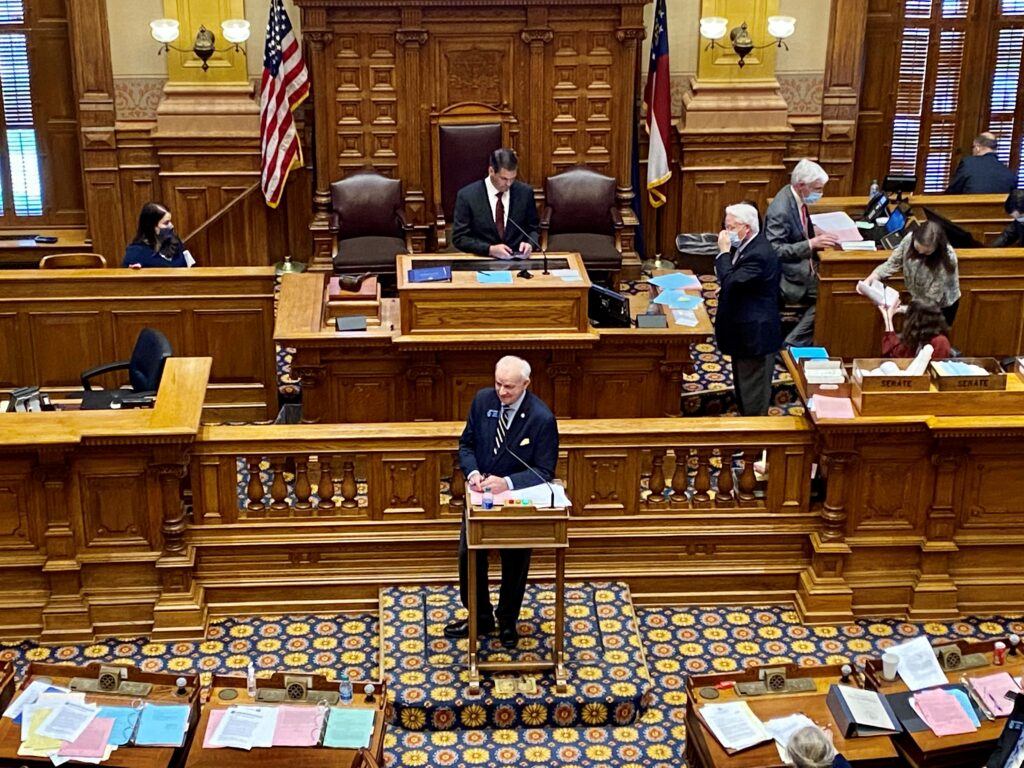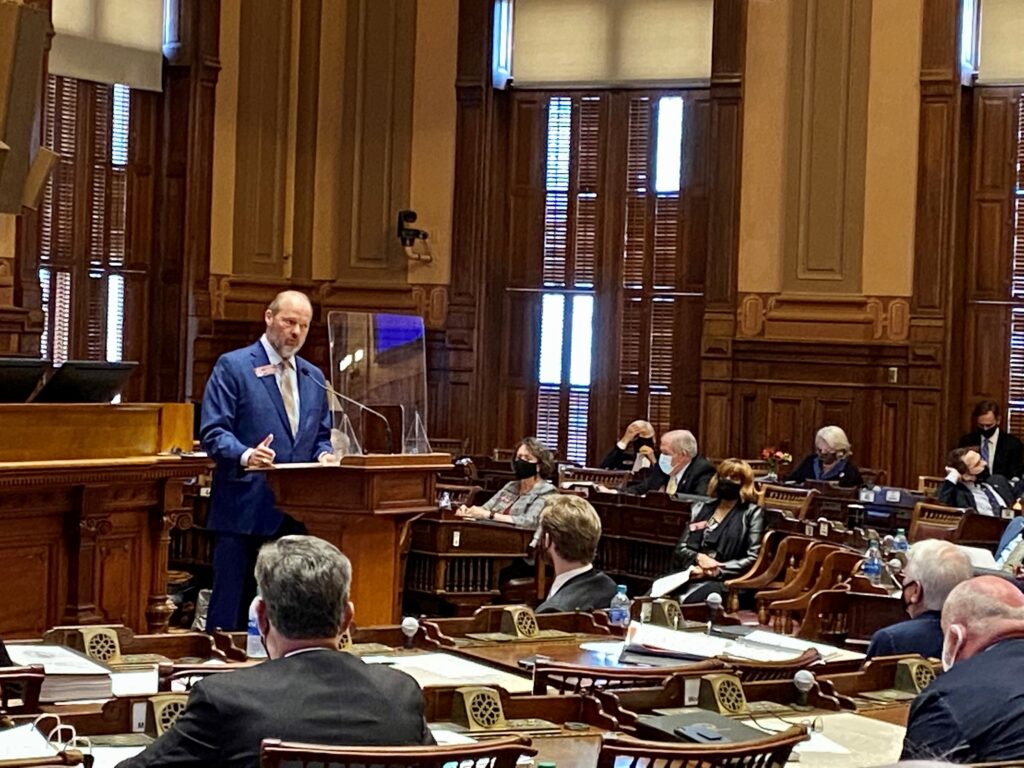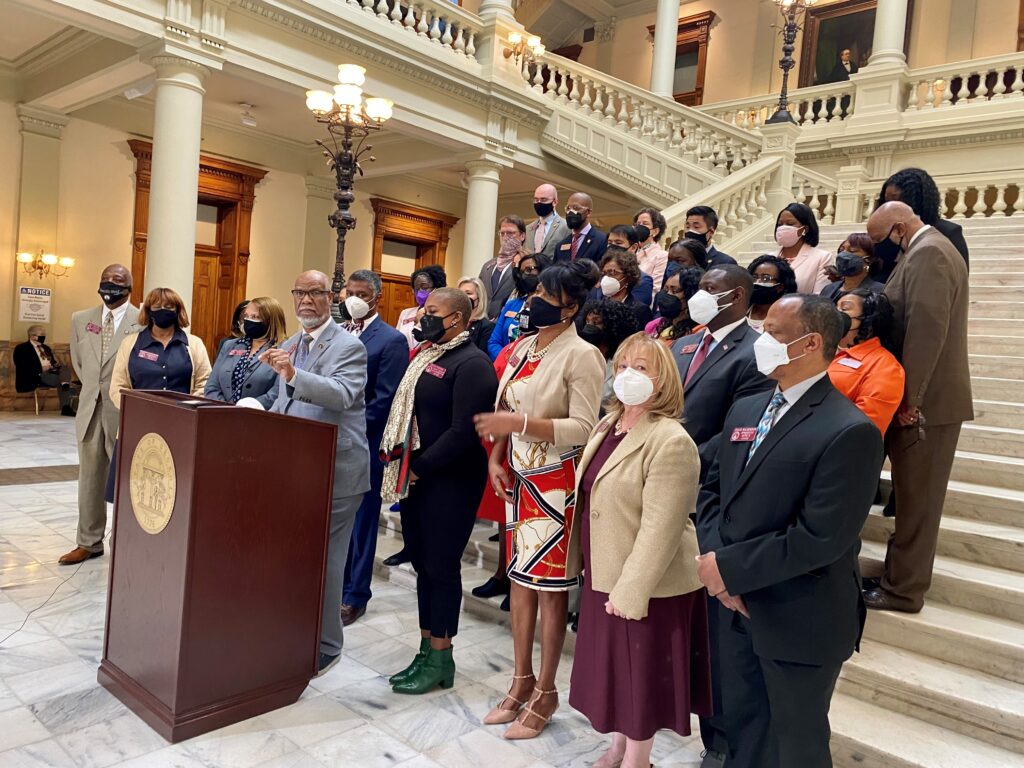
ATLANTA – Sweeping legislation to overhaul voting by mail, advance voting and state oversight of Georgia elections passed out of the General Assembly Thursday and was promptly signed by Gov. Brian Kemp after months of intense debate at the state Capitol.
The 95-page bill contains dozens of proposals pitched by Republicans that would require stricter voter ID rules for mail-in ballots, ban people from handing out food and drink to voters waiting in line outside polling places and halt absentee ballot applications from being accepted within 11 days of an election.
It cleared the state House of Representatives by a 100-75 vote along party lines Thursday before gaining final passage a few hours later in the state Senate, also by a party-line vote. Kemp signed the bill into law about an hour after its passage in the Senate.
The bill, sponsored by state Sen. Max Burns, R-Sylvania, absorbed proposals from several other election-focused measures on its way to passing out of the state legislature, swelling to nearly 100 pages from an original 2-page bill last week in a process that drew concerns over transparency.
Beyond absentee and early voting changes, Burns’ bill would also allow state officials to take over county election boards for poor performance, which Democratic leaders and voting-rights advocates argue could give Republicans a back door to influence local election operations in many counties.
The bill also dropped a prior effort by Republican state lawmakers to shrink early voting on Sundays in Georgia. It instead would require two Saturdays of early voting and give counties the option to hold poll hours on two Sundays.
Among the bill’s most contentious changes to survive final passage is a requirement that registered Georgia voters provide the number on their driver’s license or state ID card to request and cast absentee ballots. If they do not have those ID forms, voters instead would have to send in a copy of their passport, employee ID card, utility bill or bank statement.
“Our goal is to ensure election integrity and to restore or confirm confidence in the election process,” Burns said from the Senate floor shortly before the bill’s passage.
Georgia Democratic leaders have long condemned the changes pushed by Republicans, characterizing them targeted at minority and low-income voters to curb election turnout in communities where Democrats tend to draw strong support.
“Make no mistake: This is democracy in reverse,” said Minority Leader Gloria Butler, D-Stone Mountain. “We are witnessing right now a massive and unabashed assault on voting rights unlike anything we’ve seen since the Jim Crow era.”
Election bills that have sparked intense debate in the General Assembly come after former President Donald Trump and his allies sowed doubts over Georgia’s election system, calling it fraught with fraud despite the repeated rejection of Trump’s claims by state officials and federal courts in recent months.
Speaking from the House floor Thursday, Rep. Barry Fleming, R-Harlem, who has spearheaded the push for election changes in the House, framed the bill as an expansion of voter access and tighter oversight of local election officials as he presented the bill before the vote.
“The bill greatly expands accessibility of voters in Georgia and greatly improves the process of administration of elections, while at the same time providing more accountability to ensure the integrity that the vote is properly preserved,” said Fleming, who chairs the House Special Committee on Election Integrity.

A different bill by Fleming is also awaiting consideration on the Senate floor. His 45-page bill was revised earlier this week to allow counties to buy their own voting machines amid distrust over new machines manufactured by Dominion Voting Systems that were first used in Georgia during last year’s elections.
Senate Majority Leader Mike Dugan, R-Carrollton, who has overseen revisions to Fleming’s bill in the Senate, earlier this week slammed opponents for characterizing the elections bills as instruments of voter suppression, which Republicans have denied.
Democrats in the General Assembly have devoted much of this year’s legislative session to condemning moves by Fleming, Burns and top Republicans in both chambers to overhaul voting by mail and limit access to the polls, calling their measures attempts at voter suppression reminiscent of the Jim Crow era of racial segregation.
Opposition from Democrats along with by some Republican leaders including Lt. Gov. Geoff Duncan and House Speaker David Ralston, R-Blue Ridge, prompted bill drafters to scrap a controversial proposal that would have repealed no-excuse absentee voting.
Still, Democratic lawmakers view the bill overall as harmful to Georgians’ voting rights, particularly for minority communities that helped boost mail-in voting to record numbers in the 2020 election cycle amid the COVID-19 pandemic.
“You are changing the rules, cutting the polling hours and making more requirements to vote,” said Rep. Erica Thomas, D-Austell. “That’s not right, that’s not fair and that’s not just. … Too many people fought, bled and died for our right to vote.”

Republican leaders such as Dugan have bristled at that characterization, dismissing accusations that their bills aim to dampen Black and minority voters from casting ballots in Georgia.
“I think it’s demeaning to all those people who came before who actually had to work their tails off to get those repealed,” Dugan said earlier this week. “The hyperbole is unfortunate.”
Democratic leaders have also sought to paint the Republican-led election bills as an effort to halt momentum following the 2020 elections that saw Democrats carry Georgia in the presidential race and flip both of the state’s U.S. Senate seats for the first time in decades.
Rep. Calvin Smyre, D-Columbus, the legislature’s longest-serving member, said earlier this week Democrats will continue to oppose the bills even with some concessions such as ditching the repeal on no-excuse absentee voting and more weekend poll hours.
“As state legislators, our aim is to ensure that all voters, particularly voters of color, have full, meaningful and non-burdensome access to the one fundamental right, and that is the preservation of all other rights, and that is the right to vote,” Smyre said.
Lawmakers have a week more to wrap up fine-tuning of the election bills on the one hand or fighting them on them other. The last day of the General Assembly session is next Wednesday, March 31.
This story has been revised to reflect that the House and Senate have both passed Sen. Burns’ election bill.
